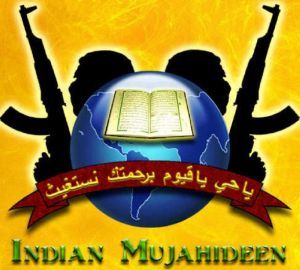
The outlawed terror group Indian Mujahideen is more lethal and resilient because of the support it receives from Pakistan, according to a new report by an American think-tank.
The report 'Jihadist Violence: The Indian Threat' by the WoodrowWilsonInternationalCenter for Scholars underlines that the Indian jihadist movement constitutes an "internal security issue with an external dimension."
"The Indian jihadist movement formed organically and as a result of endogenous factors, specifically communal grievances and a desire for revenge, but is more lethal and more resilient than it otherwise would have been, thanks to external support from the Pakistani state and Pakistan and Bangladesh-based militant groups," said the 100-page report.
The decentralised IM network has a loose leadership currently based in Pakistan, but moving between there and the United Arab Emirates and Saudi Arabia, said the report authored by noted South Asia security expert Stephen Tankel.
"External support was a force multiplier for Indian militancy rather than a key driver of it. Although the IM receives support from LeT, it should not be viewed as an affiliate within the same command-and-control hierarchy. This distinguishes the IM from some of the other LeT cells or operatives active in India," it said.
The report is based on research conducted over twenty months from January 2012 to September 2013 and draws on primary and secondary source material as well as on field interviews conducted in India, Pakistan and Bangladesh.
It argues that the Indian Mujahideen -- the primary indigenous jihadist threat -- is part of a larger universe of Islamist militant entities operating in India, many but not all of which are connected to external entities such as the Pakistani militant group Lashkar-e-Tayiba and the Bangladeshi Harkat-ul-Jihad-al-Islami.
It also asserts that the IM should not be viewed as a formal organisation, but instead is best understood as a label for a relatively amorphous network populated by jihadist elements from the fringes of the Students Islamic Movement of India and the criminal underworld.
The improper use of the IM label for all indigenous jihadist violence contributes to confusion about its composition and cohesion. The IM connects to and sometimes attempts to absorb smaller cells and self-organising clusters of would-be terrorists.
"Indian jihadists are far more lethal as a result of external support, but no longer entirely depend on it. Even in those instances where a purely indigenous attack occurs, the perpetrators often will have benefited from earlier assistance," Tankel said.
The report said that most of the terror attacks involve some admixture of foreign and indigenous elements. However, although an attack by homegrown militants with foreign support is highly unlikely to spark a war, it has become yet another hurdle to overcome as India and Pakistan seek to navigate a peace process.
Indeed, the issue of Pakistani support for the IM now merits discussion at some Track 2 events, Tankel said. Beyond the direct threat, Washington has an interest in reducing Pakistan's strategic reliance on militant proxies, but doing so entails raising the costs of this policy and reducing its utility, he wrote
"The low-cost and relatively low-risk option of covertly supporting Indian jihadists further reduces the disincentives for the Pakistani ISI of breaking with this practice. Finally, the United States is invested in India's rise and stability in South Asia. Hence any challenge to either is problematic, but one that must be kept in perspective," he wrote.

.jpg)









 © 2025
© 2025